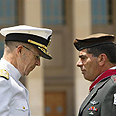
IDF chief receives decoration from US army
Lieutenant-General Gabi Ashkenazi meets with chairman of Joint Chiefs of Staff as part of series of security discussions in America. Admiral Michael Mullen surprises his Israeli counterpart by honoring him with US military's highest award
Following the reception, the two met face-to-face and discussed the issues on the agenda for about two hours.
Ashkenazi left for the United States last Saturday on an official week-long work visit, following an invitation extended to him by Admiral Mullen. He met with US Vice President Richard Cheney and with Deputy Secretary of State John Negroponte.
According to estimates, the IDF chief's talks with the Americans focused on the Iranian threat and possible military solutions.
Ashkenazi received the decoration as a special gesture during a military ceremony held in his honor at the Pentagon. Mullen called Ashkenazi over and slid the medal on his neck. He said the award was given to the IDF chief for his year long contribution to the war on terror, his work for Israel's security and his contribution to improving the security dialogue between the two armies.
Ashkenazi said Wednesday that the goal of his trip was "to understand the American outlook on the issues and problems in the Middle East. This is an excellent opportunity to make it clear to them how we see things. In this sense we see things eye to eye. We have no disagreements. The cooperation is very good."
On the eve of the IDF chief's visit to Washington, the chairman of Joint Chiefs of Staffs said that he opposes a military strike in Iran. Mullen made it clear that the US has the ability to operate on three fronts, but that he would not recommend this and is concerned about the effect of an attack on Iran on the region's future.
Ashkenazi stressed in response that Israel prefers to find a diplomatic solution for the Iranian nuclear threat, but that it must prepare for all scenarios.










